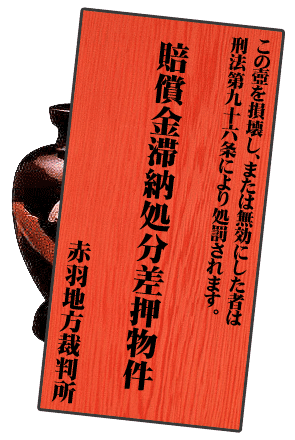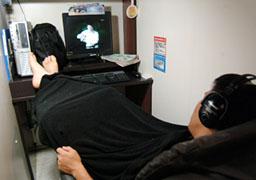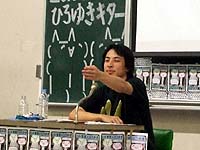A full report by an independent committee has been released detailing the scandal has embroiled the Abe administration surrounding faked “town meetings.” Since their beginning under the Koizumi administration, the meetings, which were intended to serve as a forum to include citizens’ opinions in the policymaking process for such initiatives as postal privatization and education reform, most of the meetings have been exposed as frauds, with government officials planting questions and paying participants to provide opinions supporting the government’s position. Moreover, massive cost-padding has been discovered in the administration of the meetings, which cost an average 11 million yen to hold and occasionally featured a staff member being paid to operate the elevator.
Conspicuously missing from English-language reporting on this scandal, including at least one report from a Western outlet, is the fact that the contract for administration of the first meetings was awarded to massive Japanese ad agency Dentsu with no competitive bidding. I’m just a little surprised that the angle hasn’t been more fully explored, since no-bid contracts always ripe for criticism and the Western media have had a great time slicing and dicing the Halliburton corporation for its ineptitude in Iraq.
Dentsu involvement is no secret, but so far even the Japanese-language newspapers haven’t done much to pick up that part of the story. The Asahi’s wording is especially strange:
Another revelation in the investigative committee report is that the government likely overspent on some meetings. The report said the cost of holding a town meeting in the first half of fiscal 2001 was 21.85 million yen, not including advertising, whereas in fiscal 2002 and later years the average cost per meeting was between 7.19 million yen and 12.85 million yen.
The reason is likely that in the first half of fiscal 2001, government officials selected companies to operate the town meetings. In subsequent years, the companies were chosen by competitive bidding.
Hokkaido Shimbun, reporting on the investigation results, noted that Dentsu ran the first 16 meetings since the program began in 2001, costing the Japanese government 395 million yen, or about 24 million per meeting. After the meetings were opened to competitive bidding, other companies including Dentsu managed the meetings, and the costs came down to more than half that.
An excerpt from the 2005 book Dentsu’s True Colors: The Media Industry’s Greatest Taboo, indicates that Dentsu was an advisor to the Koizumi administration from the very beginning. Along with other ideas that came to define the Koizumi administration such as US-style “one-phrase” (sound byte) politics, the town meetings were Dentsu’s idea to begin with, and the government left management of them up to the company’s discretion, leading to criticism from then-Nagano governor Yasuo Tanaka:
That was how Dentsu became involved in policymaking not just on the national level but on the local level as well, and tied it into their business.
It looks as though “town meetings” were just such an instance of Dentsu involvement. The office in charge was placed in the Cabinet Secretariat, but Dentsu was contracted to manage the town meetings with a private (no-bid) contract. One reporter commented that he was surprised one time when he went to cover a town meeting in Okinawa:
“When I went inside the hall, staff wearing Dentsu badges were all over the place. And regarding the content of the meeting, I couldn’t understand the meaning of spending money on such a thing, and the statements of the people in attendance were more like petitions than a conversation.”
The fact is, the average cost to hold these meetings was a staggering 60 times greater than what it cost to hold Nagano Governor Yasuo Tanaka’s powwow meetings, which were started earlier on.
It’s been explained by Japan policy academic Robert Angel that the town meeting scandal resulted from a lack of careful attention to the administration of the meetings, and deference to local leadership, “once the novelty wore off,” led to the planting of questions. But the planting of questions has so far been documented to have begun as early as October 2001, while Dentsu was in charge. According to Asahi, “In fiscal 2001, 185 people asked planted questions at 50 town meetings, although there is no information available to determine if the government paid them to do so.” And as e-mail records (PDF courtesy of DPJ lower house member Daisuke Matsumoto) of preparations for the meeting in Hachinohe, Aomori prefecture show, the planting of questions and guidance came from the town meeting office in the cabinet, not local leadership.
Dentsu has a reputation for being a shadowy manipulator of public opinion, and has been accused of a host of dubious accomplishments from swaying sheep-like voters with flashy pro-postal privatization campaign tactics in the September 11, 2005 general election resulting in a huge LDP victory, to staging the entire “Train Man” phenomenon on popular message board site 2-channel to reap massive profits from pre-planned soap opera and movie adaptations. However, according to an anonymous retired Dentsu official quoted in True Colors, Dentsu relishes this reputation and cultivates it: “Dentsu’s public image, as if they have been involved in national conspiracies, has had the effect of making the company look more powerful than it actually is. Dentsu is aware of this and purposefully neither confirms nor denies this role.”
As much as I’d like to see Dentsu dragged through the mud for their role in this scandal, the fact remains that the government led this initiative to deceive the public and drown out actual public opinion. Given the history of the Japanese government, this comes as little surprise, but these days scandals spread like wildfire over the Internet, people are aware and quick to anger at such flagrant ethical violations, hopefully forcing the political leadership, who increasingly relies on public support to stay in office, will start paying attention to what the public really thinks rather than staging horse and pony shows.



 On a recent evening, a 30-year-old man from Osaka entered one such place in the city’s Umeda entertainment district. He signed up for the late-night rate, which allows a five-hour stay for 1,500 yen starting at 10 p.m. The man slipped into one of the private booths, carrying a backpack.
On a recent evening, a 30-year-old man from Osaka entered one such place in the city’s Umeda entertainment district. He signed up for the late-night rate, which allows a five-hour stay for 1,500 yen starting at 10 p.m. The man slipped into one of the private booths, carrying a backpack. “I went back to my parents’ house after my home address was revealed on the Internet, but harassing phone calls kept coming into my office. Even my customers started to distrust me, thinking that I had someone (harassing me).”
“I went back to my parents’ house after my home address was revealed on the Internet, but harassing phone calls kept coming into my office. Even my customers started to distrust me, thinking that I had someone (harassing me).”